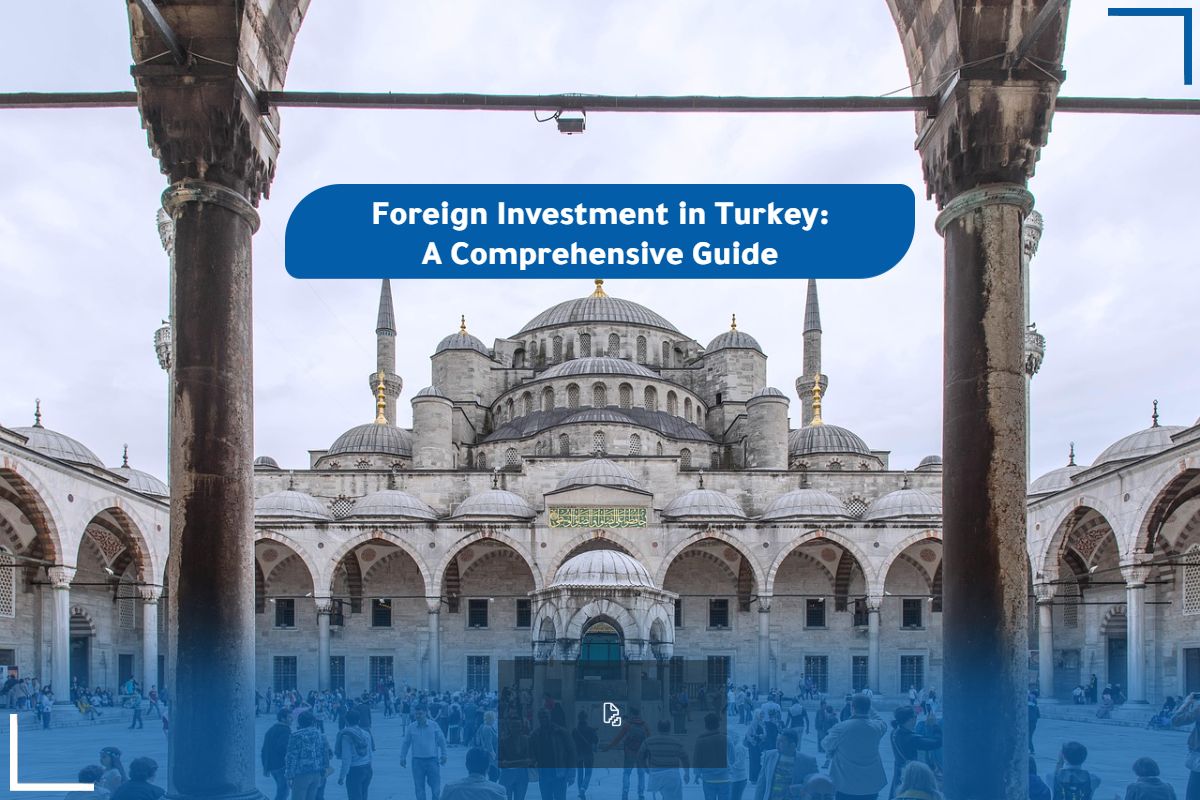Unlocking the Door to Prosperity: A Comprehensive Guide to Foreign Investment in Turkey
Introduction
The Land of Opportunities
Turkey is a country that spans the continents of Europe and Asia. It has a rich cultural heritage, a dynamic economy, and a young, educated population.
Over the last decade, Turkey has emerged as one of the fastest-growing economies in the world. It has attracted significant foreign investment due to its strategic location, large domestic market, and favorable business environment.
Overview of Turkey’s Economy
Turkey’s economy is classified as an emerging market economy with an estimated GDP of $717 billion in 2020. The country has undergone major structural reforms since the turn of the century and shifted from an agricultural-based economy to an industrial-based one. The service sector makes up around 60% of Turkey’s GDP followed by industrial production at 30% and agriculture at 10%.
Investment Opportunities in Turkey
Turkey offers several investment opportunities across various sectors such as manufacturing, energy, real estate development, tourism, healthcare services among others. Large infrastructure projects such as new airports and highways have been launched in recent years which highlights the government’s commitment to developing its infrastructure. Additionally, several incentive programs are available for foreign investors that include tax exemptions or reductions on certain types of investments.
Why Invest in Turkey?
Opportunities abound in a growing economy
Turkey is one of the fastest-growing and most dynamic economies in the world. It has experienced an average annual growth rate of over 5% since 2010, which is much higher than other developed or developing countries. The country’s GDP stood at $717 billion in 2019, which makes it the 20th largest economy globally.
Political stability and economic growth
Turkey is known for its political stability, which has made it a preferred destination for foreign investment. The country has been able to maintain democracy and progress while also managing to attract high levels of investment from across the globe. Turkey’s government has been proactive when it comes to making changes that support economic growth, including cutting red tape and investing heavily in infrastructure.
Strategic location as a bridge between Europe and Asia
Turkey’s location makes it an ideal gateway for businesses looking to access both European and Asian markets. With its proximity to some of the world’s fastest-growing economies, Turkey can provide businesses with access to new markets that they may not be able to reach otherwise.
Large domestic market and young population
With over 84 million people living within its borders, Turkey also presents opportunities as a large domestic market. Its relatively young population (with a median age of just over 30) means there is significant potential for future growth as these individuals enter their prime earning years.
Government incentives for foreign investors
The Turkish government offers numerous incentives for foreign investors looking to do business in the country. These include tax breaks, streamlined processes for setting up a business or branch office, and free zones where investors can operate without paying taxes or customs duties on their imports or exports.
Overall, Turkey offers numerous opportunities for foreign investors looking to expand their businesses and reach new markets. Its dynamic economy, strategic location, large domestic market, and government incentives make it an attractive destination for those looking to grow their businesses on a global scale.
Types of Foreign Investment in Turkey
When it comes to investing in Turkey, there are a few different options to consider. Each type of investment has its own unique advantages and disadvantages, so it’s important to carefully evaluate your goals and risk tolerance before making any decisions.
Direct Investment
Direct investment in Turkey involves the creation or acquisition of a company or assets within the country. This can take several forms, including:
- Equity capital: This involves buying an ownership stake in a Turkish company. It can be done through a joint venture with a local partner or by establishing a wholly owned subsidiary.
- Reinvested earnings: if you already have an established business in turkey, you can choose to reinvest profits back into the company.
- Intra-company loans: another option is providing financing from your parent company to your turkish subsidiary.
The advantage of direct investment is that it gives you more control over your investment and allows for greater flexibility in managing operations. However, it also comes with higher risks and requires more resources and time commitment compared to other types of investments.
Portfolio Investment
If you’re looking for a less hands-on approach to investing in Turkey, portfolio investment may be the way to go. This involves purchasing securities like stocks, bonds, or mutual funds that represent ownership or debt in Turkish companies.
The main advantage of portfolio investment is that it provides diversification through exposure to multiple companies and industries within Turkey. It also offers more liquidity than direct investment since securities can be bought and sold relatively quickly on public markets.
Real Estate Investment
Turkey’s real estate market is another popular option for foreign investors. This can involve purchasing property for personal or commercial use, or investing in real estate development projects.
The advantage of real estate investment is that it provides a tangible asset that can appreciate in value over time. It also offers potential rental income, which can provide a steady stream of cash flow.
However, the downside is that it requires significant capital upfront and comes with risks such as changes in market demand and regulatory hurdles. Additionally, navigating the Turkish real estate market as a foreigner can be challenging without the help of a local partner or advisor.
Conclusion
No matter what type of investment you choose, it’s important to carefully evaluate your options and seek professional advice before making any decisions. By taking the time to do your research and work with trusted partners, investing in Turkey can be a profitable opportunity with high potential for growth.
Industries with High Investment Potential in Turkey
Energy: Renewable Energy, Natural Gas Pipelines
Turkey’s energy sector is vast and diverse. As the country aims to reduce its dependence on imported energy sources, renewable energy has become a hot topic for investment in recent years.
The government offers incentives and a favorable regulatory framework for companies that invest in renewables such as solar, wind, geothermal and hydroelectric power plants. Besides renewables, natural gas pipelines can also be lucrative investments due to Turkey’s strategic location between Europe and Asia.
Infrastructure: Transportation, Telecommunications
Transportation infrastructure is a priority in Turkey as the government looks to upgrade existing infrastructure and build new ones. Investment opportunities are available in areas such as roads, highways, railways, airports and ports. The country is also investing heavily in telecommunications infrastructure with a goal of improving connectivity across the nation.
Manufacturing: Automotive, Textiles
Turkey has a long history of manufacturing expertise with industries ranging from automotive to textiles. The automotive industry has experienced significant growth due to high demand both domestically and internationally. Turkish textile companies are known for their quality products at competitive prices which give them an advantage compared to other countries.
Tourism
Tourism contributes significantly to the Turkish economy; it accounts for about 10% of GDP. With its rich cultural heritage and diverse attractions such as beautiful beaches along the Aegean coast or historical sites like Cappadocia’s cave dwellings or Istanbul’s Hagia Sophia Museum; there are endless opportunities for investors looking into tourism sector investments.
Steps to Investing in Turkey
Researching the market and identifying potential partners or advisors
Before investing in Turkey, it is important to research the market thoroughly. You should look into the industries that are thriving in the country and determine if they align with your investment goals.
You should also research potential partners or advisors who can help guide you through the process of investing in Turkey. This could include consulting firms, legal professionals, and local business contacts.
Registering a company or branch office
To invest in Turkey, you will need to register a company or branch office with the government. This process can be quite detailed and involves submitting various documents and forms.
You will also need to choose a name for your company and determine its legal structure. The registration process can take several weeks, so it is important to start early.
Obtaining necessary permits and licenses
Once your company is registered, you will need to obtain any necessary permits and licenses for your specific industry. This may include environmental permits, zoning permits, building permits, or specialized licenses depending on what type of investment you are making.
Opening a bank account
To operate in Turkey, you will also need to open a bank account with a local bank. This will allow you to make transactions easily within the country. It is important to choose a reputable bank that offers competitive rates and services for foreign investors.
Hiring local staff
When investing in Turkey, it is essential that you hire local staff who understand the culture and language of the country. This will help ensure that your business operations run smoothly and effectively. You may also need to hire translators or language tutors if there are any communication barriers.
Complying with tax regulations
It is important that you comply with all tax regulations when investing in Turkey. This includes paying income tax, value-added tax, and other applicable taxes.
It is recommended that you work with a local accountant or financial advisor to ensure that you are meeting all necessary requirements. Investing in Turkey can be a complex process, but by following these steps and working with the right professionals, you can navigate the process successfully.
Challenges to Foreign Investment in Turkey
Bureaucracy and Red Tape
One of the biggest challenges foreign investors may face in Turkey is the bureaucracy and red tape. Obtaining necessary permits and licenses can be a lengthy and complicated process. Additionally, navigating the legal system can be challenging for those unfamiliar with it.
Language Barriers
Another challenge foreign investors may face is language barriers. Although English is widely spoken in major cities, many people outside these areas only speak Turkish. This can make communication difficult, especially when dealing with government officials or local partners.
Cultural Differences
Cultural differences can also pose a challenge for foreign investors. Turkish culture emphasizes personal relationships and trust, which means that building long-term relationships with local partners is essential. Understanding cultural norms and etiquette is also important to avoid misunderstandings.
Political Instability
Political instability may also be a concern for some investors. In recent years, Turkey has experienced political turmoil that has resulted in economic uncertainty. This instability could impact investment decisions.
Conclusion: Is Investing in Turkey Right for You?
Despite the challenges outlined above, investing in Turkey can offer significant benefits for foreign investors seeking growth opportunities in emerging markets. The country’s strategic location as a bridge between Europe and Asia, large domestic market, young population, government incentives for foreign investment, and potential industries with high investment potential all make it an attractive choice for many investors.
However, before making any investment decisions it’s important to carefully consider the potential risks involved as well as your own individual goals and risk tolerance. With proper research and due diligence though, investing in Turkey can be a smart move that leads to long term success.


